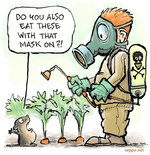Paul Whybrow
Full Member
There was a depressing report in the Guardian this week, about how UK fruit & veg contains a “cocktail of pesticides.”
Cocktail of pesticides in almost all oranges and grapes, UK study finds
I eat 8 portions of fruit and four portions of fresh vegetables daily, so I might have been doing myself more harm than good!
Some of you may remember that Meryl Streep campaigned against pesticides poisoning people by tainting fresh food way back in 1990.
Simply Streep – The Meryl Streep Archives » Mothers and Others for Pesticide Limits
Video: Simply Streep – The Meryl Streep Archives » Mothers and Others PSA (1988)
It beggars belief that this situation is legal, but then, the bottom line of making a profit is always more important than ensuring the population is healthy.
What do you think?

Cocktail of pesticides in almost all oranges and grapes, UK study finds
I eat 8 portions of fruit and four portions of fresh vegetables daily, so I might have been doing myself more harm than good!
Some of you may remember that Meryl Streep campaigned against pesticides poisoning people by tainting fresh food way back in 1990.
Simply Streep – The Meryl Streep Archives » Mothers and Others for Pesticide Limits
Video: Simply Streep – The Meryl Streep Archives » Mothers and Others PSA (1988)
It beggars belief that this situation is legal, but then, the bottom line of making a profit is always more important than ensuring the population is healthy.
What do you think?

